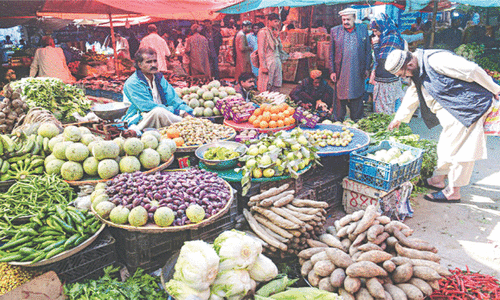ISLAMABAD: Annual inflation slowed for the fourth month to 17.3 per cent in April, the lowest level in nearly two years and significantly less than the record 38pc reading in May 2023, official data showed on Thursday.
The country has been beset by inflation above 20pc since May 2022 as it navigated reforms as part of an International Monetary Fund bailout programme.
The headline inflation is measured by a basket of goods and services called the Consumer Price Index (CPI). The Pakistan Bureau of Statistics data showed that the index dropped 0.4pc compared to the previous month, dipping into negative territory for the first time since June 2023.
Prime Minister Shehbaz Sharif described the downward trend of inflation as “welcome news” for the people. He said that inflation falling towards the lowest level in nearly two years showed improvement in the economy.
PM describes low CPI reading as ‘welcome news’ for citizens
“This is the result of the hard work done during the 16-month-long government led by the Pakistan Democratic Movement (PDM) and continued by the interim government,” Mr Sharif said in a statement issued by his office.
However, economists have a different view on the low inflation rate. Former economic adviser and economist Dr Ashfaq H. Khan told Dawn that low inflation was mainly due to three factors: the high base last year, no increase in the discount rate, and stability in global commodity prices.
“We are measuring inflation from a high base of last year,” he said. This did not mean that prices did not increase or dropped in April, he said.
The State Bank of Pakistan (SBP) kept its key interest rate unchanged at 22pc for the seventh straight in its latest policy meeting.
The finance ministry, in its monthly economic report, said it expected inflation to hover between 18.5pc and 19.5pc in April and further ease to 17.5pc-18.5pc in May.
According to the IMF and central bank projections, inflation is expected to decrease in the final quarter of the current financial year.
The average CPI inflation during the 10 months (July to April) of the current fiscal year now stands at 25.97pc compared to 28.23pc a year ago.
The IMF has also forecast the average inflation rate for the current fiscal year at 25.9pc, a significant decrease from the previous year’s 29.6pc.
In April, urban inflation was 19.4pc year-on-year and -0.4pc month-on-month, down from 21.9pc and 1.4pc in March. Rural inflation was 14.5pc year-on-year and -0.9pc month-on-month, down from 19pc and 2.1pc in the previous month.
Food, core inflation
Food inflation for April stood at 11.3pc in urban areas and 9.5pc in rural areas, whereas non-food inflation was 25.6pc in urban areas and 20pc in rural areas.
Core inflation, which strips out volatile food and energy prices, slightly increased to 13.1pc in urban areas compared to 12.8pc last month. In rural areas, core inflation was recorded at 19.3pc, down from 20pc.
Main contributors
In urban areas, the food items whose prices saw the highest month-on-month increase in April included chicken (21.38pc), fish (2.49pc), potatoes (2.29pc), meat (1.94pc), milk powder (1.34pc), bakery and confectionary (1.04pc), readymade food (0.68pc), pulse mash (0.38pc), rice (0.30pc), mustard oil (0.21pc), milk products (0.14pc), cigarettes (0.01pc), etc.
The month-on-month decline was recorded in prices of onions (-15.58pc), fresh vegetables (-11.98pc), wheat (-10.44pc), wheat flour (-9.67pc), tomatoes (-6.23pc), eggs (-4.30pc), pulse gram (-1.15pc), pulse masoor (-1pc), sugar (-0.96pc), fresh fruits (-0.95pc), besan (-0.85pc), gram whole (-0.49pc), wheat products (-0.44pc), etc.
In the non-food category, increase was observed in footwear (17.16pc), cotton cloth (9.74pc), woollen cloth (3.82pc), motor fuel (3.63pc), marriage hall charges (2.58pc), education (2.34pc), personal grooming services (2.10pc), transport services (1.50pc), house rent (1.45pc), recreation and culture (1.26pc).
In contrast, electricity charges (-9.50pc), liquefied hydrocarbons (-0.60pc), and construction input items (-0.12pc) declined month-on-month.
Published in Dawn, May 3rd, 2024













































Dear visitor, the comments section is undergoing an overhaul and will return soon.